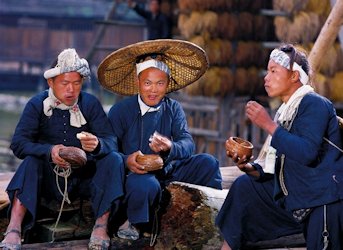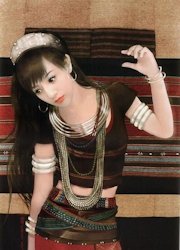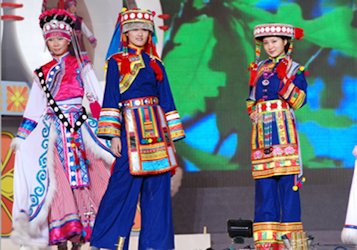|
The Va people live mainly in compact communities in
the Ximeng, Cangyuan, Menglian, Gengma, Lancang, Shuangjiang, Zhenkang and
Yongde counties in southwestern Yunnan Province. There, they coexist with other
ethnic groups such as the Han, Yi, Dai, Hani, Lahu, Jingpo, Blang, De'ang and
Lisu.
The Va people have a unique spoken language, which belongs to the Austroasiatic
family. They previously had no written language, but an minbetic script was
created for the Va people in 1957. Prior to then, the Wa people kept records
and accounts or passed messages to each other by using material objects or by
engraving bamboo strips.
The Va people call themselves "Wa", "Lei Wa", "Ba Rao", "Bu Rao", etc.
According to historical records, the Va people are the descendants of the
"Baipu" people who lived before the Qin period (221 BC- 26 BC). During the Qing
Dynasty they were called "Ha Wa", "Ka Wa", etc and with the founding of the
People's Republic of China (PRC), they were formally named the "Wa" by the
government after unanimous approval from the people.
The
Va people live in bamboo houses that are similar in shape to those of the Dai
people. The Wa people are hospital and warm to their guests. When guests
enter their house they will be entertained with wine in bamboo cups as a token
of welcome and respect. The Va speak a Mon-Khmer south Asian language. Most
are nature worshippers, but some are Hinayana Buddhists or Christians.
|


